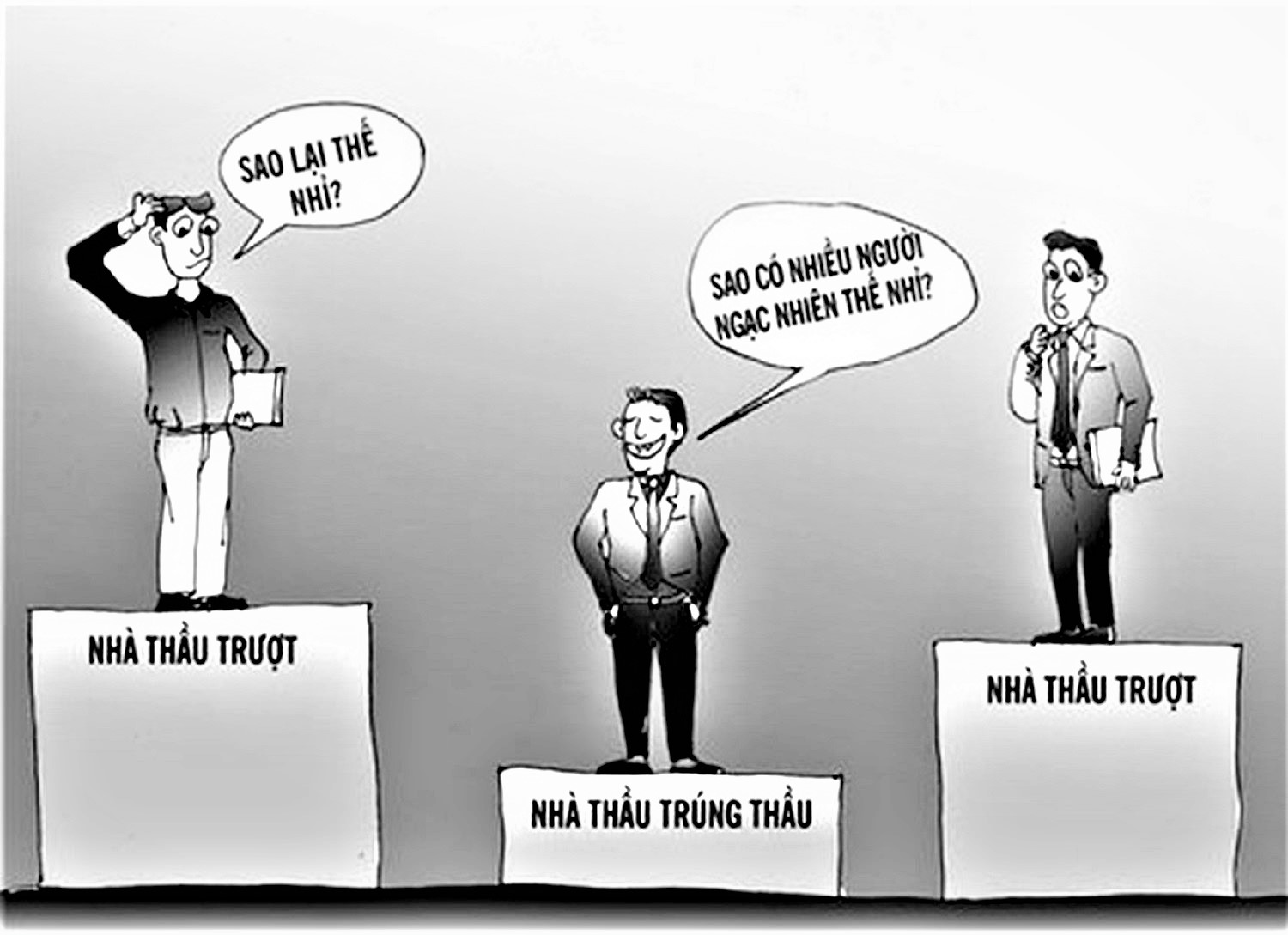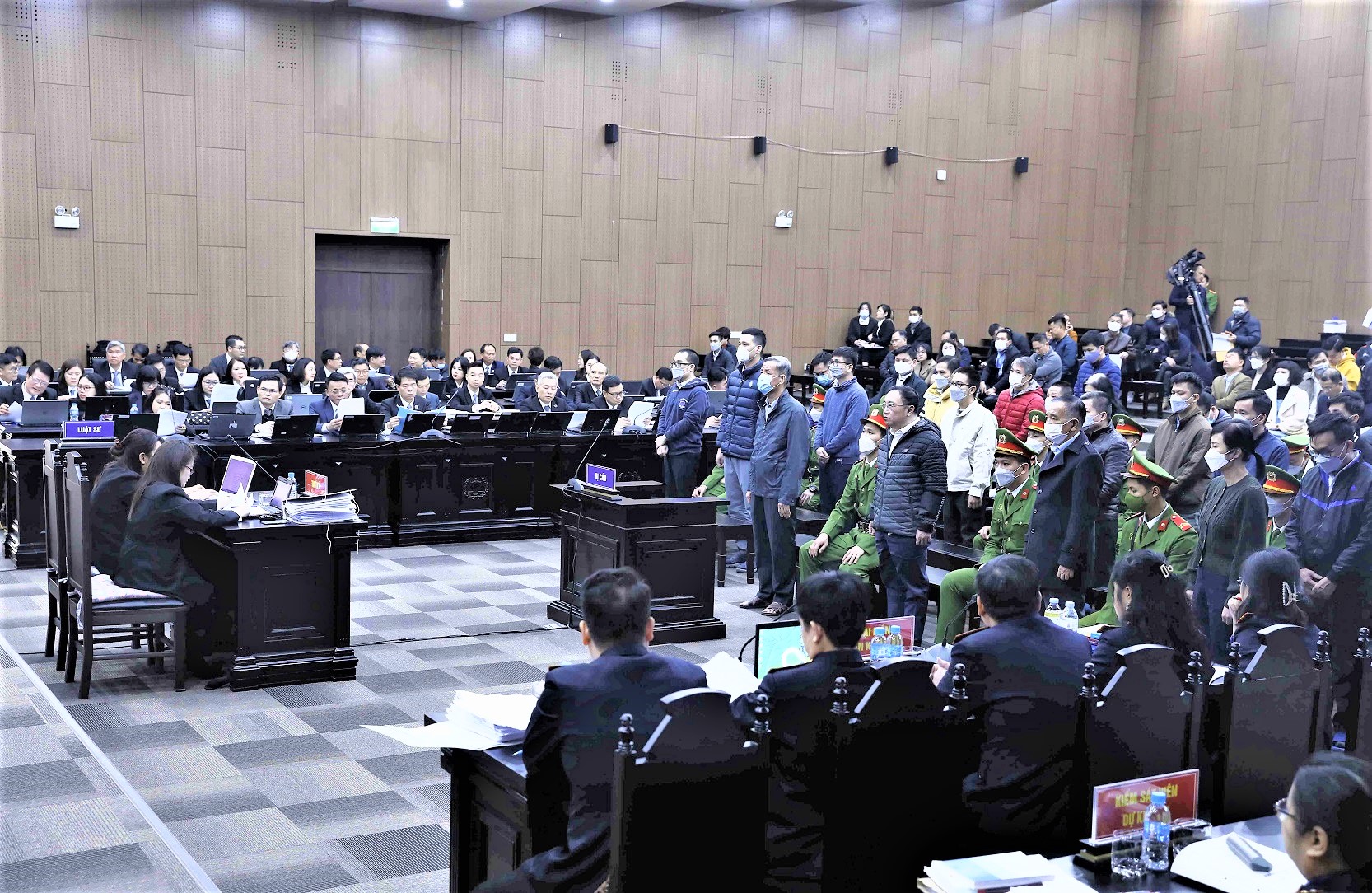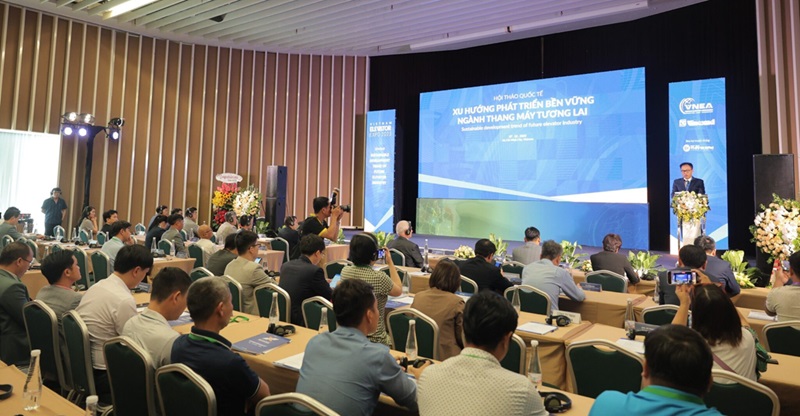EM – A series of violations of regulations on bidding, causing serious consequences, have been discovered and handled recently, causing great loss of property of the government and the people. From land, construction, information technology, health care, education, even wastewater treatment…, each of the subjects used different tricks to make profit.
Everything is correct, why is there mistake still?
It seems that all the winning bidders meet the criteria for capacity specified in their capacity documents and bidding documents. However, violations still occur with huge losses related to bribes, withdrawal of government money, products and works in the bidding package when done with poor quality, rapid deterioration …
When questioned, the responsible agencies provide their own arguments. That the bidding is public on the government bidding system, anyone can access, check, compare. Each specific bidding package is due to specific investors who have been assigned rights and are responsible for the work they are in charge of. Bidding documents must clearly state that they fully and best meet the requirements set out to be able to win the bid. So what is the cause of the errors?
When all are wrong, will they become right (!?). As it turns out, to turn wrong into right, along with a huge amount of commissions are enough “dirty” tricks to be enchanted by many groups of people to win the bid.
The first, quite common “trick” is to divide bidding packages to apply the form of appointment of contractors or give urgent and convincing reasons such as “serving against natural disasters, epidemics or bidding packages in the government secret” (!?) to appoint contractors. Clause 3, Article 33 of the Law on Bidding 2013 (which is still in force) stipulates: “The division of procurement projects and estimates into bidding packages must be based on technical characteristics and implementation order; ensure the uniformity of the project, the procurement estimate and the reasonable size of the bidding package”. Point k, Clause 6, Article 89 of the Law on Bidding 2013 also stipulates that one of the prohibited acts in bidding is “Dividing procurement projects and cost estimates into bidding packages contrary to the provisions of this Law for the purpose of appointing a contractor or restrict the participation of contractors”. Meanwhile, Article 54 of Decree 63/2014/ND-CP stipulates the limit of contractor appointment:
“1. Not more than 500 million VND for bidding packages to provide consulting services, non-advisory services, public services; no more than 01 billion VND for bidding packages for goods procurement, construction and installation, mixtures, drugs, medical supplies and public products;
2. Not more than 100 million VND for the bidding package included in the regular procurement estimate”.
However, many investors still circumvent these regulations, subdividing bidding packages to apply contractor appointment.… There are also cases where investors gather many small bidding packages into complex bidding package that only a particular enterprise or a group of enterprises has arranged in advance (in the form of a joint venture, this preparation was silently carried out years before, when the bidding was opened, the other contractors could not meet the requirements, thereby eliminating competing bidders. The goal of the collection of huge bidding packages is to be able to cover up and transfer costs from “exposed” items to “hidden” items to bypass the audit and take advantage of the budget. This will leave the competition ground for a few super contractors, who can make big games that individual contractors can’t do, which can cost “lobby “. The target of this behavior is to limit enterprises to meet the bidding package conditions.

Many tricks were used to win the bid
The second, intervene, install bid-direction terms. Investors intentionally install new bidding terms to target their own contractors, eliminate the participation of other contractors, and turn open bidding into limited bidding. The law on bidding documents is aimed at selecting the best contractors, meeting the requirements set forth. However, there are also criteria that are not tight enough to be taken advantage of to eliminate unwanted contractors. There are many cases where, right from the beginning, investors and contractors are used to shake hand, setting up technical criteria in bidding, and even building bidding documents together. The nature of this trick has turned the bidding into a disguised contractor appointment.
Typically, investors when building bid documents to purchase elevators with the requirement that the brand or origin of goods must be manufactured in G7 countries, Japan and imported synchronously. This is one of the conditions that are said to be discriminatory against Vietnamese goods in bidding. For example, the package of supplying and installing the elevator system belongs to the Project of Building the Headquarters of the Tax Department of Phu Nhuan District (HCMC), the Joint Stock Commercial Bank for Investment and Development of Vietnam – Phu Quoc Branch; Headquarters project of Ba Ria – Vung Tau branch…, bidding document in 2017 all clearly states that “elevators provided by contractors must be manufactured by recognisable firms in G7 industrialized countries”…Or the investor gives the condition that the G7 brand name, the origin from Asian countries, but there is no Vietnamese name in this list!
In addition, many investors install more sophisticated conditions through technical criteria in the bidding documents. They will comply with the provisions of the law on the manufacturer and origin, but bidding document requires a specific model of the company for which the investor wants to win. This requirement is very difficult to fulfill because the brand name is rare in the market. For example, recently, there was a bidding package for supply and installation of elevators under the project to renovate and expand the working office of the Government Treasury in a southern province. In the “Technical evaluation criteria” section, bidding documents require elevator code Meta200. According to elevator experts, this is a completely unfamiliar and uncommon code that is not included in any famous elevator brand, even locally and abroad. Therefore, many contractors believe that this criterion is not excluded for the purpose of orienting and creating advantages for a certain contractor.

On the morning of January 4th, 2023, the Hanoi People’s Court issued first-instance judgments of AIC, in which many defendants were guilty of “violating regulations on bidding, causing serious consequences”.
The third is forging or deliberately falsifying bids, establishing alliances. There are a number of contractors who specialize in bidding only to fail to pave the way for a pre-determined contractor to win the bid with the help of the investor and the contractor supervising parties. Typically, the case occurred at the Dong Nai Hospital project, the president of AIC company set up and hired many companies to act as the, helping AIC to win 16 bidding packages, causing damage to the government more than 152 billion VND.
The fourth is collusion with the appraiser to inflate the value of the bidding package. This is the most used trick in all the cases related to violations of regulations on bidding to extort money from the government budget, typically the case of Viet A colluding with the price appraisal party to raise the price of the set. The test kit caused thousands of billions VND in damage to the budget.
Along with the above tricks is harassment and negativity in bidding activities. If so, it will create a series of businesses that focus on developing relationships instead of focusing on building and developing sustainable internal resources. It is also a reason for an undeveloped economy.
Consequences often cannot be measured in money!
Mistakes in bidding are not only that many projects are behind schedule, the Government’s money is lost and wasted, but many cadres, civil servants and local leaders, departments, businesses… are prosecuted and sentenced to prison, causing considerable damage to the country.
In fact, many businesses that use tricks to win bids do not have the real capacity in terms of personnel, management, and financial potential to compete fairly. Therefore, they can make false claims about their personnel, but they have to hire low-quality personnel. Their financial potential is not enough to execute the contract, so they must borrow. In some cases, the winning unit chooses the easy packages to implement first, then runs away, leading to the investor having to spend a large amount of money to overcome the consequences. In some case, contractor after winning the contract, resell it.
Meanwhile, qualified contractors, doing genuine business often cannot pay large commissions or deeply lower the price of the bidding package. They must invest in human resources, effectively manage human resources (highly qualified and skilled training, high remuneration for highly skilled personnel), purchase quality assurance materials and equipment to complete the contract and also a considerable amount for warranty and maintenance of products and works in the bidding packages.
From weaknesses in human resources, financial potential, management and to lower the price of the bidding package to exclude other businesses… the winning enterprise will find a way to complete the package by gutting the work, overstating the price of materials, equipment is done carelessly (by hiring low-qualified staff or self-employed at low prices to increase profits). There have been cases in the past when bidders used the winning bid method with a low bid price, and then tried to adjust the total investment, the cost incurred was very high. When the bidding package was delayed, the delay in implementation caused the bidding package to be delayed. All of the above tricks lead to government budget losses, works and products that are not quality assured. In fact, there are roads, sidewalks that have just been tested and taken over for not long and already are broken, or housing areas that deteriorate rapidly…
Another consequence is that the violation of regulations on bidding has caused genuine businesses to reduce their motivation to dedicate, becoming cautious, worried, and suspicious of each other… in bidding activities. When all businesses follow the development of “relationship capacity” instead of focusing on building and developing production management capacity, improving, expanding scale… where will the national competitiveness in the future become?
There are still worries
Through cases related to violations in bidding activities, it has been shown that there is aiding of officials, local leaders, and management agencies in bidding processes to make profit and serve the interests of the group
In many cases, enterprises participating in bidding are also contributing factors to distort the bidding environment, losing transparency and fairness. That is the status of the commission for the bid solicitor. The act of giving back the commission is also a factor forming the “axis of evil” “group interests” cause great damage to the government and the people.
According to a survey by the Vietnam Federation of Trade and Industry in 2021, out of the total surveyed businesses, up to 25% of enterprises actively pay unofficial costs when participating in bidding. 10.3% of enterprises said that they pay at the suggestion of the official in charge of bidding. “It is noteworthy that 58.9% of enterprises said that paying unofficial costs in bidding is an unwritten law that enterprises must understand when participating in it,” a National Assembly delegate stated in November 2022…
Facing many cases of violations of regulations on bidding, causing such serious consequences, law experts questioned whether the current Bidding Law and related legal documents after 10 years of implementation have loopholes for people to take advantage of? Along with that, the fact that there are interest groups shaking hands to profit, causing damage to the government budget reveals shortcomings in management?
Some contractors also said that the contractor’s petitions are often not resolved by the investor, or if they are resolved, they are only approximate and formalism. And the lack of an agency to supervise the handling of petitions in the bidding, to evaluate and handle petitions satisfactorily is also the reason why the petitions are not considered. Therefore, the contractors wait for the regulations on supervision and handling of complaints in bidding to be made public, hoping that the relevant authorities will be fair when handling petitions./.
Le Hung



